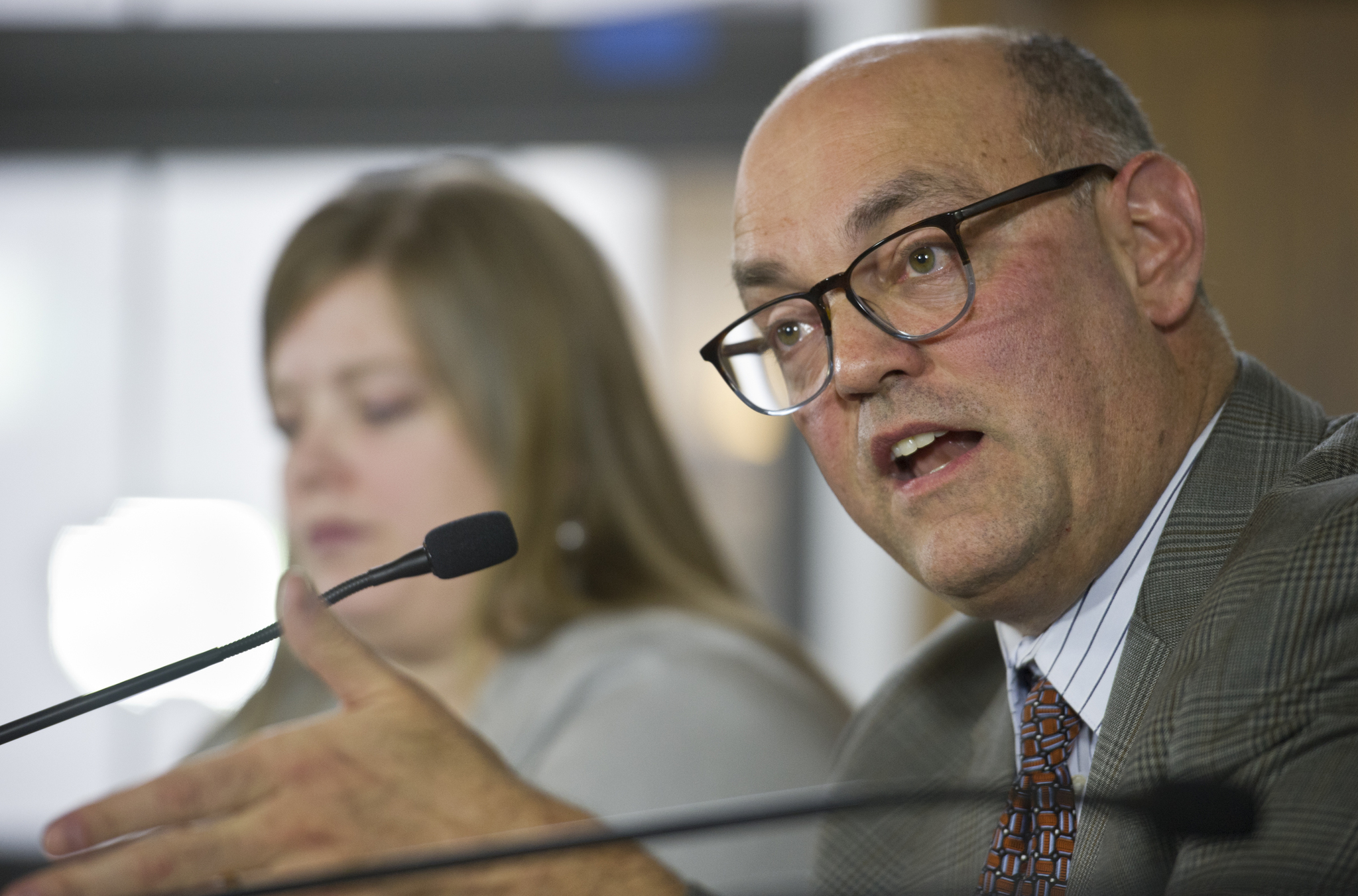Last summer, Rep. David Guttenberg a Democrat from Fairbanks, sat in a meeting of the House Finance Committee and voted against a bill that would have erased more than half of Alaska’s $3.1 billion annual deficit by using the earnings of the Alaska Permanent Fund.
The bill had already passed the Senate and appeared to be bound for a do-or-die vote on the House floor. Instead, it died in committee by a single vote.
“That was probably the toughest vote I have ever taken,” Guttenberg said in a Tuesday press conference.
At the time, Guttenberg and another Democrat on the committee, Rep. Scott Kawasaki, also of Fairbanks, said they couldn’t vote “yes” because the state was still spending too much to subsidize oil and gas exploration on the North Slope.
“I have relived that many times,” Guttenberg said Tuesday.
Now, he’ll do it again.
On Wednesday morning, the House Resources Committee introduced House Bill 111, a measure intended to reduce the state’s subsidy of the oil and gas industry.
As it was last year, the bill is a keystone in a multi-part approach to balance the deficit.
As it was last year, it will be intensely controversial, and the debates about its merits will last months.
As it was last year, its passage may determine whether or not the Legislature fixes Alaska’s deficit before the state’s savings run out.
“We have an overly generous system of subsidies that needs to be reformed,” said Rep. Geran Tarr, D-Anchorage and co-chairwoman of the resources committee, in a press conference after the bill’s introduction.
“This is one of the four (budget solution) pillars of what the House Majority is looking at,” agreed Rep. Andy Josephson, D-Anchorage and Tarr’s co-chairman. “People want the budget cut.”
The state currently offers oil producers a tax credit if they lose money while drilling on the North Slope. This credit is intended to help new producers who are spending hundreds of millions of dollars drilling new wells but haven’t started pumping oil.
The credits are equivalent to 35 percent of a company’s net losses. HB 111 reduces that to 15 percent.
When oil prices plunged starting in late 2014, the state discovered that due to a loophole, big oil producers could claim these credits too. Because those companies racked up hundreds of millions in credits, the state now has a debt of more than $1 billion.
The governor has repeatedly vetoed payments on that debt while lawmakers seek a solution.
Last year, lawmakers voted to narrow the loophole so only companies producing less than 50,000 barrels of oil per day are eligible for the credit. HB 111 reduces that figure to 15,000 barrels per day.
Last year, lawmakers also capped the amount of credits a company can claim in a given year. HB 111 reduces that cap from $70 million to $35 million.
The new bill also seeks to change tax rates; it raises the minimum tax from 4 percent (at oil prices above $25 per barrel) to 5 percent (at all prices). It also “hardens” the tax floor. Companies can’t go below the minimum by using their tax credits. Right now, companies can reduce their tax rate to zero.
Many of the pieces in HB 111 were included in an oil subsidy reform proposal from a pair of Republicans last year. That proposal was later rejected by the Senate in favor of a measure that included fewer cuts.
“We’re still going through the bill, but as they said, some of these provisions aren’t new, and they will have a negative impact on big and small companies,” said Kara Moriarty, president/CEO of the Alaska Oil and Gas Association.
AOGA and other industry advocates have said that the state’s system of subsidies is important to compensate for Alaska’s high cost of business. Shipping equipment and supplies to Alaska is expensive, for example.
Under the state’s previous system of subsidies, oil production rose 3.2 percent in fiscal year 2016, bucking predictions. Thanks to collapsing prices, that oil was worth less. Greater oil production didn’t result in greater employement, either.
Alaska lost 3,000 of its 14,100 oil and gas jobs between 2015 and 2016, according to the Alaska Department of Labor and Workforce Development. A third of all oil and gas workers are not state residents, DOL statistics show.
Speaking Wednesday, Tarr and Josephson said they don’t yet know how much money the state will save if HB 111 is signed into law. That will depend upon the results of analyses and research that will be conducted by the resources committee over the next few months.
“It will be a very deliberative process; every committee member will have an opportunity to weigh in,” Tarr said.
In addition to being deliberative, the process will be contentious.
Wednesday offered a preview as members of the Republican House Minority launched an extended floor debate merely over the names of the bill’s sponsors.
Republican members of the resources committee wanted the bill to come from Tarr and Josephson, not from the committee on which they sit.
“I don’t want to have my name on this thing,” said Rep. Chris Birch, R-Anchorage.
The House voted 23-15 to overrule their objections.
In the months to come, there will be extensive debates and discussions. The role of HB 111 in an overall budget solution will be determined.
“This is a critical piece,” Josephson said.
Speaking Tuesday, Guttenberg said he doesn’t regret his vote last year.
“I still think that I did the right thing,” Guttenberg said.
He, like other lawmakers, will have more opportunities to think about their choices.
HB 111 has been referred to the House Resources Committee. If approved there, it will go to the House Finance Committee.
Guttenberg is still a member.
• Contact reporter James Brooks at james.k.brooks@juneauempire.com.

